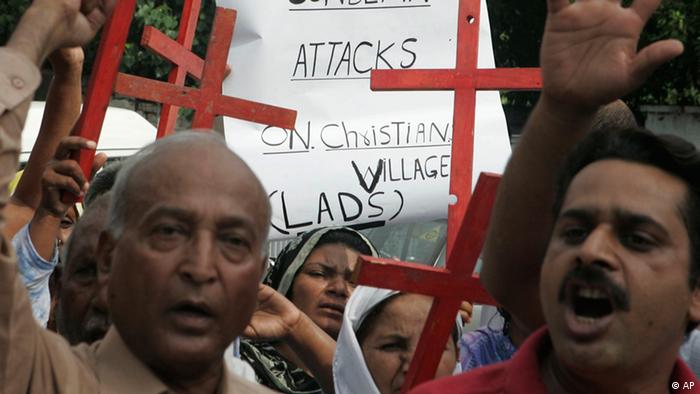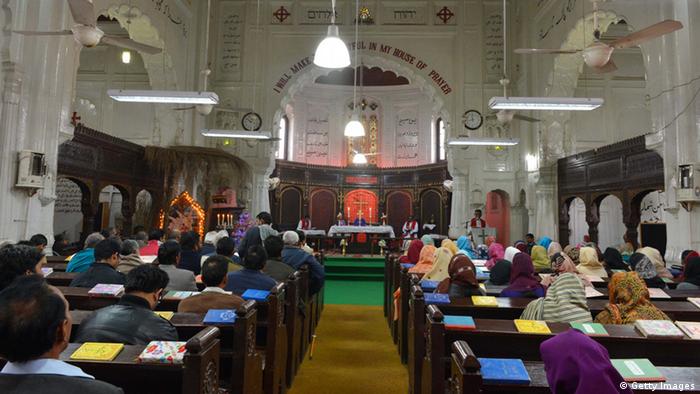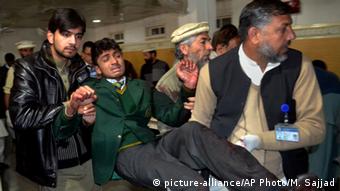Pakistan's Christian community is observing a somber Christmas this year to show solidarity with the victims of the Peshawar attack. DW analyzes why the inter-faith harmony is needed in the country more than ever.
"I bought new clothes to celebrate Christmas, but I am not going to wear them," said seven-year-old Michael. The resident of Peshawar, the capital city of the restive northwestern Khyber Pakhtunkhwa province, told DW it was not a time to rejoice.
"We feel saddened over the killings of so many children in the attack on the Army Public School last week. We stand with their families and relatives."
More than 140 people, mostly children, were killed in a militant attack on an army-administered school in Peshawar on December 16. The Islamist Tehreek-e-Taliban Pakistan (TTP) outfit claimed responsibility for the assault. It took the Pakistani commandos several hours to break the school siege and free the hostages.
The attack led to widespread condemnation of the Taliban both locally and internationally. A large number of Pakistanis demanded the government take decisive action against all Islamist groups in the country once and for all.
'We can never forget'
Peshawar's Christians offered special prayers for the school victims and their families in the city's churches on Christmas Eve.
"We can never forget the young students and the trauma of their parents as we observe a subdued Christmas today," an elderly Christian woman told DW at a special ceremony organized by the Peshawar Church in the memory of the December 16 victims.
Some 29 survivors of the school attack are still in hospitals. The city's medical sources told DW the condition of some of the wounded kids was critical.
"It was the most painful incident in the history of our city," said Nazir, another participant of the church ceremony.
No solidarity from Muslims
Pakistan's Christians, who make up less than a two percent of the Islamic country's 180 million population, rarely receive this kind of support from the majority Sunni population.
Last year in September, just two months before Christmas, Peshawar's Christians were burying their own dead. On September 22, two suicide bombers blew themselves up in the courtyard of Peshawar's All Saints church, killing 82 and leaving as many injured. The attack on the church in the northwestern Pakistani city is believed to be the deadliest ever against the Christian community. No Sunni cleric held memorial services for the deceased.
For decades, the All Saints church symbolized religious harmony in the Islamic Republic and was revered by Christians and Muslims alike. But in the past four or five years, Pakistan has witnessed an unprecedented surge in Islamic extremism and religious fanaticism. Islamist groups, including the Taliban, have repeatedly targeted religious minorities in the country to impose their strict Shariah law on people. Not only that, Christians and other minorities have been attacked and mistreated by common Pakistanis numerous times for allegedly insulting Islam or the prophet Muhammad.

2009 protests against the more than 70 Christian houses and many churches burned in Gojra, Punjab province
In November, a young Christian couple was beaten to death by a mob in the small town of Kot Radha Kishan in the eastern Punjab province, a political stronghold of Prime Minister Nawaz Sharif. The angry crowd, which alleged that Shehzad and Shama desecrated a copy of their holy book, the Koran, subsequently burned their bodies in a brick kiln where the couple worked.
A forgotten case
Asia Bibi, a Pakistani Christian woman convicted of blasphemy, has been languishing in prison for more than five years. The 49-year-old mother of five was arrested in June, 2009 after her neighbors complained that she had made derogatory remarks about Islam's prophet, Muhammad. A year later, Bibi was sentenced to death under the Islamic Republic's controversial blasphemy law despite strong opposition from the national and international human rights groups.
The slim hope that the Pakistani judiciary might pardon Bibi and eventually release her was dashed in November when the Lahore High Court (LHC) ruled to uphold her 2010 death sentence.
"We must not let the story of Asia Bibi go unnoticed. The fact that she has been in prison for five years doesn't mean that it shouldn't be news anymore. We need to keep up the pressure and make sure that her story is told and retold. That's the least that we owe to her," Dr. Clare Amos, a Program Executive and Coordinator for the Geneva-based World Council of Churches' inter-religious dialogue and cooperation program, told DW.
Amos added that the issue of violence in Pakistan should not be looked at in isolation.
Political and religious solidarity
"First they came for the Shiites. I did not speak out, because I was not a Shiite. Then they came for the Christians. I did not speak out, because I was not a Christian. Then they came for the Peshawar children, and I didn't speak out again, because they were not my children. Soon they will come and attack my children," Shah Ahmed, a Karachi-based social activist, told DW, echoing the famous anti-Nazi statement made by German pastor Martin Niemöller.
Ahmed said people should forget their differences and stand up against terrorism. "What happened in Peshawar was so brutal that it cannot be explained in words. These barbarians, the Taliban, will kill us all if we don't act now," Ahmed said.
Jibran Nasir, a leader of the #ReclaimYourMosques movement, which began after the Peshawar attack and has now spread to several Pakistani cities, believes it is high time that all political and religious parties unite against the menace of terrorism.
"People ask us, what if our campaign gets hijacked by a political party? We say we are welcoming all parties to come and own this movement," Nasir wrote on his Facebook page.



No comments:
Post a Comment